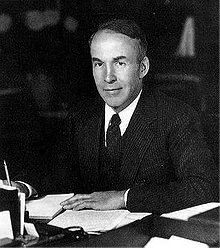 Modernist poet and triple Pulitzer Prize winner Archibald MacLeish was born May 7th 1892 in Glencoe, Illinois. His Glasgow-born father Andrew was a merchant and his mother Martha, who could trace her family back to the Mayflower, was a college professor. MacLeish was educated at Yale, where he began his writing career with the Yale Literary Magazine and he won a prize for his sonnet sequence Songs for a Summer’s Day. He then studied at Harvard Law School, where he edited the Harvard Law Review. In 1916 he married Ada Hitchcock and married life was soon interrupted by the First World War. He drove an ambulance during the war and then became an artillery captain. His first collection of poems, Tower of Ivory, was published in 1918.
Modernist poet and triple Pulitzer Prize winner Archibald MacLeish was born May 7th 1892 in Glencoe, Illinois. His Glasgow-born father Andrew was a merchant and his mother Martha, who could trace her family back to the Mayflower, was a college professor. MacLeish was educated at Yale, where he began his writing career with the Yale Literary Magazine and he won a prize for his sonnet sequence Songs for a Summer’s Day. He then studied at Harvard Law School, where he edited the Harvard Law Review. In 1916 he married Ada Hitchcock and married life was soon interrupted by the First World War. He drove an ambulance during the war and then became an artillery captain. His first collection of poems, Tower of Ivory, was published in 1918.
MacLeish’s early poetry was an attempt to make sense of the new world ushered in by the war. He wrote very long, convoluted poems, a short extract of which is here in Two Poems From The War:

Returning to Harvard after the war he graduated in 1919, spent a short period editing The New Republic, an American political magazine, then worked as a lawyer for three years. He decided to forego a legal career in order to pursue a life as a writer and to this end, he and his wife moved to Paris, France. There they joined other expat writers like Gertrude Stein and Ernest Hemingway and later decamped to the French Riviera which had become the destination of choice for many famous writers and artists. Whilst in Paris MacLeish had some small success with the publication of his poem Einstein, widely regarded as MacLeish’s attempt to portray an understanding of Einstein’s ‘quest for knowledge’.
His return to America saw him editing and writing for American business magazine Fortune. He became politically active during the 1930s and started to ally himself with the anti-fascist and anti-capitalism causes. This led him to write a play, Panic, about the fall of the world’s richest man in the great bank panic of 1933. He later said of this,

Throughout the 1920s and 30s he wrote long, complex, epic poems, well-received works, which perhaps charted his own ‘quest for knowledge’ and understanding of the transition of the old world into the new.
MacLeish’s writing career was interrupted by his controversial appointment as Librarian of Congress. Even though his experience as an expat in France and his lack of training, together with his known political leanings, irked many, Franklin D Roosevelt saw qualities in MacLeish which he felt would inspire the American public and, at the same time help Roosevelt to a third Presidential term. MacLeish went on to serve the Library with distinction.
In WW2 his writing skills served him well as director of the War Department’s Office of Facts and Figures, dealing mainly with propaganda. Following this he was Assistant Secretary of State for Public Affairs then represented the US in the creation of UNESCO. After that he returned to writing and continued to work with the arts and libraries and became the first Librarian of Congress to name the US Poet Laureate.
MacLeish eventually retired from public life and died on April 20th 1982, just short of his ninetieth birthday.

